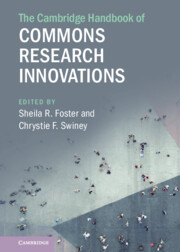Book contents
- The Cambridge Handbook of Commons Research Innovations
- The Cambridge Handbook of Commons Research Innovations
- Copyright page
- Contents
- Figures
- Tables
- Contributors
- Introduction
- Part I Revisiting the Origins and Evolution of Commons Thought
- Part II Averting New Tragedies
- 4 Averting Tragedy of the Resource Directory Anti-Commons
- 5 Time and Tragedy
- 6 Transforming Climate Dilemmas from Tragedy to Cooperation
- Part III New Forms of Contested Commons
- Part IV Urban Landscape and Infrastructure as a Commons
- Part V Reassessing Old and New Institutions for Collective Action
- Part VI Managing and Restoring the Commons
- Part VII Law, Legal Theory, and the Commons
- Part VIII Technology, the Internet, and the Future of Commons Governance
- Index
5 - Time and Tragedy
The Problem with Temporal Commons
from Part II - Averting New Tragedies
Published online by Cambridge University Press: 29 October 2021
- The Cambridge Handbook of Commons Research Innovations
- The Cambridge Handbook of Commons Research Innovations
- Copyright page
- Contents
- Figures
- Tables
- Contributors
- Introduction
- Part I Revisiting the Origins and Evolution of Commons Thought
- Part II Averting New Tragedies
- 4 Averting Tragedy of the Resource Directory Anti-Commons
- 5 Time and Tragedy
- 6 Transforming Climate Dilemmas from Tragedy to Cooperation
- Part III New Forms of Contested Commons
- Part IV Urban Landscape and Infrastructure as a Commons
- Part V Reassessing Old and New Institutions for Collective Action
- Part VI Managing and Restoring the Commons
- Part VII Law, Legal Theory, and the Commons
- Part VIII Technology, the Internet, and the Future of Commons Governance
- Index
Summary
The resource management complications posed by “Temporal Commons”– the common pool of time shared by present and future generations when making resource management decisions – are understudied in the literature. This chapter attempts to briefly describe their nature, before detailing how the typical solutions to the tragedy of the commons – private property, government regulation, and Elinor Ostrom’s successful collective action model – fail to adequately account for temporal commons. Next, the chapter explores some factors that distinguish temporal commons from traditionally studied commons, making them subject to a potentially more inevitable form of tragedy. The chapter concludes with initial thoughts on avenues for better addressing the dilemmas created by temporal commons.
Keywords
- Type
- Chapter
- Information
- The Cambridge Handbook of Commons Research Innovations , pp. 55 - 65Publisher: Cambridge University PressPrint publication year: 2021

